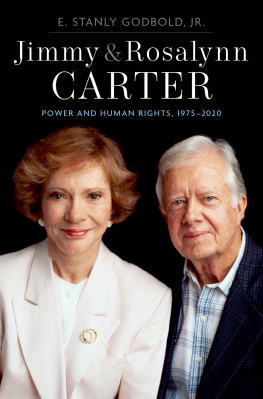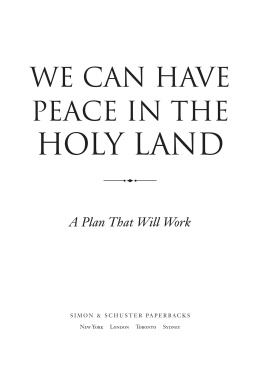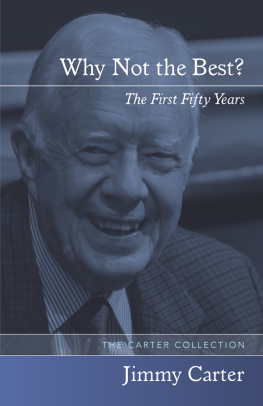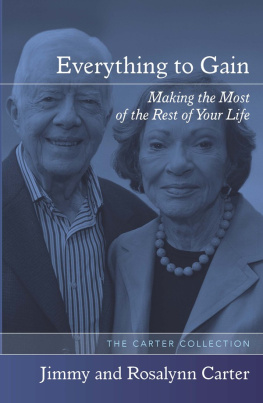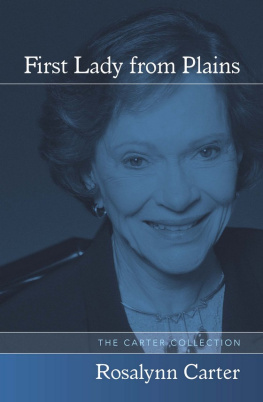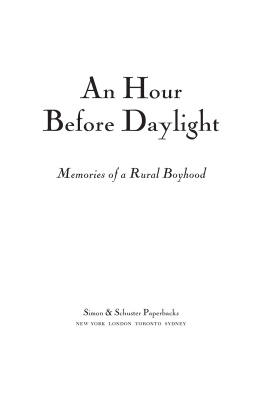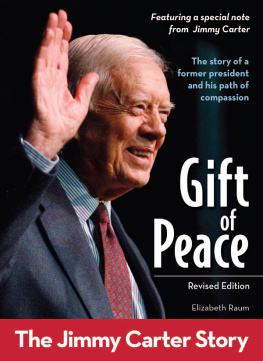Jimmy and Rosalynn Carter

Oxford University Press is a department of the University of Oxford. It furthers the Universitys objective of excellence in research, scholarship, and education by publishing worldwide. Oxford is a registered trade mark of Oxford University Press in the UK and certain other countries.
Published in the United States of America by Oxford University Press
198 Madison Avenue, New York, NY 10016, United States of America.
E. Stanly Godbold, Jr. 2022
All rights reserved. No part of this publication may be reproduced, stored in a retrieval system, or transmitted, in any form or by any means, without the prior permission in writing of Oxford University Press, or as expressly permitted by law, by license, or under terms agreed with the appropriate reproduction rights organization. Inquiries concerning reproduction outside the scope of the above should be sent to the Rights Department, Oxford University Press, at the address above.
You must not circulate this work in any other form and you must impose this same condition on any acquirer.
CIP data is on file at the Library of Congress
ISBN 9780197581568
eISBN 9780197581582
DOI: 10.1093/oso/9780197581568.001.0001

TO JEANNIE
IN MEMORY OF MARTIN I. ELZY
FOR MY FATHER AND MY SON
Contents
My family comes first. When Jeannie married me on that rainy day in Starkville, Mississippi, December 30, 1988, neither she nor I imagined the life we had ahead. Eighteen months later I was spending long days, weeks, and months in the Carter Library in Atlanta. She helped with the research, made many a trip to Atlanta, kept the rest of our lives afloat, and always believed that we could do it. My stepdaughter Heidi, during her high school years, helped process the voluminous number of photocopies I brought home from the Carter Library. My son Kran, a scholar himself, gave help, encouragement, and plenty of advice. In time, they gave the most precious gift of all in the persons of four beautiful grandchildren: Samuel, Thomas, Maya, and Neha. My parents, Ed and Louise Godbold, would have moved mountains, and almost did, to make certain I would not be tied forever to that cotton farm in Sumter County, South Carolina. At both Duke University and Southern Methodist University, I was fortunate to have excellent professors and intelligent fellow students who stimulated my interest in learning and writing. My mentor at Duke, Robert H. Woody, became a close companion and co-author on one of my earlier books.
Many people, famous and less so, kindly granted me interviews. Their names are listed in the bibliography, but special credit should go to Tip ONeill, Edmund Muskie, Cyrus Vance, and Stansfield Turner, all of whom granted me extensive amounts of time under what must have been difficult circumstances for them. Steven Hochman, a highly accomplished historian who is a special assistant to Jimmy Carter, had many conversations with me and helped arrange my interviews with the Carters. He read many of the chapters in the final draft and offered excellent corrections and suggstions. Jimmy and Rosalynn Carter granted me interviews, access to papers and photographs, and respected the distance I tried to maintain in order to create a detached work of scholarship. Nevertheless, they deserve the credit for living such incredible and productive lives, creating and preserving the evidence that will serve many generations, and despite human foibles, being both servant and beacon for humankind.
Because this project has spanned more than three decades, to acknowledge properly all the people, institutions, and pets who helped is a task at which this account falls short. Since this volume is a sequel to my Jimmy & Rosalynn Carter: The Georgia Years, 19241974 (2010), those people and institutions acknowledged in that earlier volume deserve equal credit for their contributions to this one. At the Jimmy Carter Presidential Library in Atlanta, my home away from home for many years, the following administrators and archivists served me patiently and brilliantly: Don Schewe, Martin Elzy, David Alsobrook, Jay Hakes, Robert Bohannan, Susan Ament, Bettie Joe Brown, Betty Egwinike, Gary Foulk, Jim Herring, Yolanda Logan, Shelia Mayo, Ceri McCarron, Mary Anne McSweeney, Sylvia Naguib, Bert Nason, Sonia Robinson, Keith Shuler, Sara Saunders Mitchell, David Stanhope, Chuck Stokely, Jim Yancey, Polly Nodine, and others. Sara Mitchell was particularly helpful in acquiring and processing much of the art work. The staffs of the Georgia Department of Archives and History and the Woodruff Library at Emory University helped in many important ways.
The Gerald Ford Foundation awarded me a grant to research in the Gerald R. Ford Library. The staffs of the presidential libraries of John F. Kennedy, Ronald R. Reagan, George H. W. Bush, and George W. Bush welcomed me and guided my research in their collections. Other libraries where I found collections and able assistance include: Library of Congress, the Oral History Collection at Columbia University, the James Earl Carter Library at Southwestern State University, Lake Blackshear Regional Library, and the Lander University Library.
My home university, Mississippi State, supported me with a job, sabbatical leaves, and occasional research assistance. The staff of Mitchell Memorial Library, especially reference librarian Amanda Clay Powers, guided me through baffling technology as well as assisting with collections, interlibrary loans, and fast responses to my numerous ask a librarian questions. The John C. Stennis Oral History Project assisted with my interviews and travel budget. Former students who worked as research assistants include: David Gleeson, Richard Haydel, Kevin Hall, Qiming Han, Todd Herring, David Hirsch, Todd Holden, Tony Iacono, Craig Piper, John Selman, Ryan Semmes, Tommy Upchurch, Kenneth Vickers, and others. Kenneth Vickers and Tommy Upchurch read and critiqued many of the chapters in the first volume, and much of their research contributed to this volume. Non-student volunteer helpers include George Robson, Scott McMurry, Russell Motter, Louise Godbold, John Glass, and Susan Wansbrough.
Two special colleagues who shared many hours in the Carter Library, lunches, visits with families, meetings at professional meetings, lengthy discussions, and exchanges of information deserve my great appreciation. They are Carl Biven of Georgia Tech University and Leo Ribuffo of George Washington University.
Although I worked from primary sources as thoroughly as possible, this book is built upon those of many others who have written about the Carters. They include the excellent studies by the scholars, journalists, biographers, and memoirists whose works are cited in the notes and bibliography. Special thanks go to the distinguished television journalist Mary Beth Durkin of Yellowbrickroad Productions, who jumpstarted my work on Rosalynn Carter and brought me into conversation with others who were helpful, namely, Peter Bourne, Scott Kaufman, Allida Black, and Susan Hartman.
Scholars and friends who read all or parts of the current volume include Martin Elzy, Richard McMurry, Fred Smith, Phil Chase, Kranti Dugar, and Jeannie Godbold. Martin Elzy, the retired assistant director of the Carter Library, gave bibliographical advice as well as suggestions for corrections in the first two chapters. Fred Smith, an accomplished and well-published scholar of twentieth-century America, gave much of his retirement time to helping correct factual errors and put this manuscript into good English and proper scholarly form. Richard McMurry, a much-published and prize-winning Civil War historian, as well as friend for many years, was the kind of sharp, quick, and detailed critic I needed. Kranti Dugar, my son and a fine scholar in his own right, helped with both research and technology questions. Jeri Weiser, a high-tech specialist, solved technical problems quickly and speeded the manuscript to conclusion.

